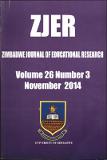| dc.contributor.author | Taringa, Beatrice | |
| dc.coverage.spatial | Zimbabwe. | en |
| dc.date.accessioned | 2016-03-22T11:39:42Z | |
| dc.date.available | 2016-03-22T11:39:42Z | |
| dc.date.issued | 2014-11 | |
| dc.identifier.citation | Taringa, B. (2014) Implications of the portrayal of women in Shona proverbs for gender sensitive teaching and learning of ChiShona, Zimbabwe Journal of Educational Research, vol. 26, no.3, pp. 395-409. Harare: HRRC. | en |
| dc.identifier.issn | 1013-3445 | |
| dc.identifier.uri | https://opendocs.ids.ac.uk/opendocs/handle/20.500.12413/10224 | |
| dc.description | A research paper on gender sensitive language in portraying women in the teaching and learning of Shona language in Zimbabwe. | en |
| dc.description.abstract | It has become quite common among educationists interested in gender issues in education to examine gender insensitivity in relation to equity, inequality and access by focusing on altitudes of teachers and school administrators, assessing the biased nature of the curriculum and teaching and learning materials. This article examines proverbs on women in order to find out the kind of ideas they express about gender at both levels of philosophical and literal meanings. It also explores the proverbial thinking about the status, and attitudes about women and how this may impact on the education of both boys and girls in terms of gender. The article is based on content analysis of 12 purposively sampled proverbs. This is triangulated with information about the meanings and implications of the proverbs from individual and focus group interviews. The sample consisted of purposively sampled 10 lecturers who either teach ChiShona students or majored in ChiShona at some level or are of Shona ethnic origin. It also included 5 student teachers who take ChiShona as their main subject and 5 ChiShona bridging course students at Mkoba Teachers' College, Gwent, Zimbabwe. Data was collected through open ended and semi- structured interviews and documentary analysis. Overall, the article is based on qualitative methods of data collection and interpretation. The findings are that while at the philosophical level the proverbs may appear gender neutral; the literal understanding connected with reference to women in the proverbs are ambivalent in terms of gender bias towards various topical themes such as sources of wealth, achievement and sustenance of families. These findings are significant as an initial step in thinking about a gender sensitive teaching of Shona proverbs in ChiShona language teaching. | en |
| dc.language.iso | en | en |
| dc.publisher | Human Resource Research Centre (HRRC), University of Zimbabwe (UZ) | en |
| dc.rights.uri | http://creativecommons.org/licenses/by-nc-nd/3.0/ | en |
| dc.subject | Education | en |
| dc.subject | Gender | en |
| dc.title | Implications of the portrayal of women in Shona proverbs for gender sensitive teaching and learning of ChiShona | en |
| dc.type | Article | en |
| dc.rights.holder | University of Zimbabwe (UZ) | en |


